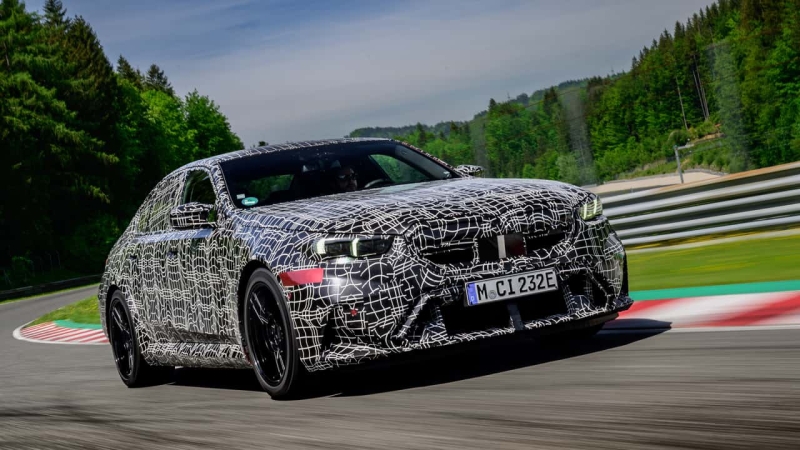Wringing the neck of 2025’s hottest sedan to answer a question: Does the biggest, heaviest, baddest M5 drive any better?
BMW USA
You’ve already seen the news. The M5 is back. Like every generational leap before this seventh-gen super sedan, BMW brought enough performance hyperbole to blow a hole in the sun.
Its new M5 is the heaviest, baddest, most-powerful, most-capable, and most-complex one yet. Again. The burning question: do heaps of hyperbole make the M5 any better to drive? BMW invited us to Austria’s Salzburgring to answer that question.
| Quick Specs | 2025 BMW M5 |
| Engine | Twin-Turbo 4.4-Liter V-8 Hybrid |
| Output | 717 Horsepower / 738 Pound-Feet |
| 0-60 MPH | 3.5 Seconds |
| Weight | 5,930 Pounds |
| Price | $120,675 |
But first, the M5 basics, abridged: A 4.4-liter twin-turbo V-8 feeds 577 horses through an eight-speed automatic. This time, power routes to all four wheels by default, though the driver can select two-wheel drive when the mood strikes.
Bolstering the internal-combustion mill is a 194-horsepower electric motor integrated within the transmission. The pair produces a total of 717 horsepower and 1000 Newton-meters (that’s 738 pound-feet of twist, but doesn’t a nice round thousand read better?).
With 18.6 kilowatt-hours worth of batteries living in the Bimmer’s belly, you’ll manage around 42 miles before the dino juice steps in to wake the V-8. BMW claims that’s more pure electric distance than any competitor.
There’s the requisite widebody treatment, M5-only exterior touches, and a chassis specific to BMW’s sportiest sedan. Twenty-inch wheels up front. Twenty-ones out back. Hankook rubber wrapped the wheels of our prototypes, though different markets receive different tires across the board.
BMW allowed a few three-lap back-to-back sprints of the Salzburgring in a camouflaged M5 prototype, plus ample seat time in a production-ready M4 CS. These laps illustrated a number of commonalities and disparities between the cars’ approaches to speed.
In the first seconds behind the wheel, the M5’s hybrid system dominates proceedings. The Salzburgring’s pit exit blends into a short sprint down its front straight, which means a slam on the gas as you head toward the track’s first corners, then heavy brakes into a right-left chicane that requires a darting, squared-off pair of steering inputs.
This corner complex tells you much about the new M5.
First thought: Shit it’s fast. Second thought: OH SHIT IT’S FAST. BMW claims a 0-62 mph time of 3.5 seconds, but it’s a typical case of Munich scrawling awwww shucks on the stat sheet; I’ll bet it sprints to sixty considerably faster.
Car and Driver clocked the sixth-gen M5 at an astonishing 2.6 seconds to 60, and because performance figures only go one way, this new M5 must be the fastest-accelerating production BMW of all time, especially from a low dig.
Then you hit that chicane.
The new M5 moves with a confidence that betrays its considerable mass. You expect roll. You expect the front end to wash. You expect the chicane’s curbing to spit a rear wheel into the air and for the whole chassis to erupt in a crackling ball of flame. But it doesn’t.
Instead the car is about as serious as a Jason Stratham sneer. It hunkers through the chicane, even as I throw more and more curbing at the chassis just to see what happens. The M5’s rear-steer system adds up to 1.5 degrees of angle to lance all that wheelbase through tight curves and you’d have to say it works here.
The M5 behaves a lot like an M3 Competition in the tight stuff and a lot like the Starship Enterprise on the straights. Like every modern M car, it feels like the development team chased absolute composure for this M5’s chassis, rather than constant engagement.
Much of that is communicated by the steering feel typical of modern BMWs: quick and linear, heavy enough, mostly dull, and reliable as an anvil. But over rough trackside curbing where the M4 CS’s chassis might buck the wheel back in your hands, the M5’s more-compliant chassis and less-busy steering simply iron out the feedback.
This M5 is as point-and-shoot as they come.
That carries over to the chassis tuning in general. The Salzburgring’s lengthy back straight is plagued with waving pavement at the track’s fastest point. Even at speeds well into the triple digits, this new M5 feels sublime under heavy compression and with supremely settled rebound.
By comparison, the M4 CS felt far edgier down the S-Ring’s back straight, where you sail waaayyyyyy into the triple digits and crack fifth gear just as you ask the car’s nose to turn into the heaviest braking zone on the track. As you’re entering the braking zone, there’s a few weird lumpy divots in the track surface that ask a whole lot of questions of any car’s suspension.
The M5 shrugs it off.
Its handling balance leans toward oversteer, but only after exhausting buckets of neutrality. This powertrain punches out huge torque coming out of the corners, but there’s far more traction here than in the M4 CS.
And by comparison, I’m not even sure you’re giving up much apex speed to the shorter, wilier M4 CS heading into the chicane at that first big braking zone, heading into the chicane, but I’ll bet at the curbing on the corner exit, you’ve got an extra 10 mph.
You really feel that difference in torque with this seventh-gen M5 compared to the outgoing car. It’s not that the old one lacked for power, but in this age of twin turbos and slightly lower displacement to compensate, that hit of electric power makes a huge amount of difference coming out of low-speed corners.
With this xDrive all-wheel-drive system, you couldn’t ask the M5 early enough for power. And there’s so much front-end grip.
But there’s a lot that a track test this limited can’t tell us.
I can’t tell you how many laps a set of these Hankooks will last, or how the brakes handle corralling all this mass after a 30-minute stint in your local bull ring, or how the hybrid system stands up to continued heat cycling. Nor can I tell you what it’s like to drive on a real road just yet.
I will say, the car looks absolutely fabulous in the flesh. Depending upon your aesthetic leanings, that makes the new M5 rarer than a hen’s dick in the BMW portfolio.
Probably there’s some lone hero barricaded in the BMW Welt shouting HODOR HODOR HODOR, heaving every last snapping muscle fiber against the tasteless horde of onrushing designers who’ve just been DYING to slap a big stupid grille on the 5 Series.
Hold the door so long as your might shall remain, my tasteful king.
What was I saying? Yes! We viewed a “finished” prototype with a full interior, functioning doors and working infotainment. We weren’t able to drive that one, but were able to poke around the interior for a good minute.
It’s another hit, to my eyes. Mercedes-Benz, Audi, Porsche, and the rest have fallen behind BMW in terms of interior design. Who’d have imagined that in 2010?
The new M5 will make its owner—likely to be a big ol’ BMW dork—feel very special indeed. Where the other Germans tend to revel in dour, sleek, monotone spaces, BMW spruces the interior with absurd slashes of color—always the iconic blue, red, purple of BMW’s M division—to lighten the mood.
Oh and the seats. They’re fantastic. These thrones have a cushy La-Z-Boy seat bottom, with powered bolsters that’ll hug you as hard as you ask (and then some). They’re so much better at providing comfort and support on a racetrack than the M4 CS’s paltry thrones, you gasp when you fall into one after having sat in the other.
One of the most important tasks for any M5 is that even when the car is parked, it should be a pleasant place to sit. Mission accomplished here.
So what’s the (early) verdict? From a sample size this small, we can’t say for sure.
As a track tool, the M5 does the thing modern BMW does best: It delivers a sense of relentless speed with supreme confidence. You’ll take FTD at your local track day in this M5 and won’t break a sweat.
Overall, this new M5 hybrid is a cushy, confident, capable thing. Looks great too. Its powertrain produces a tall, seamless wall of crushing power and its chassis has the chops to rein that in.
We’ll update this site with a thorough test after the car is widely available, starting with production in July of this year. But from a cursory look, it sure seems like BMW’s built another great M5. Again.
Competitors
- Audi RS7 Performance
- Cadillac CT5-V Blackwing
- Porsche Panamera Turbo E-Hybrid
Get the best news, reviews, columns, and more delivered straight to your inbox, daily. Sign up For more information, read our
Privacy Policy and Terms of Use.
2025 BMW M5 Prototype
Engine Twin-Turbo 4.4-Liter V-8 Hybrid
Battery 14.8-Kilowatt-Hour Lithium-Ion
Output 717 Horsepower / 738 Pound-Feet
Transmission Eight-Speed Automatic
Drive Type All-Wheel Drive
Speed 0-60 MPH 3.4 Seconds
Maximum speed 190 Miles Per Hour
Weight 5,390 Pounds
EV Range 25 Miles (est.)
Seating Capacity 5
Base Price $120,675
On Sale Late 2024



